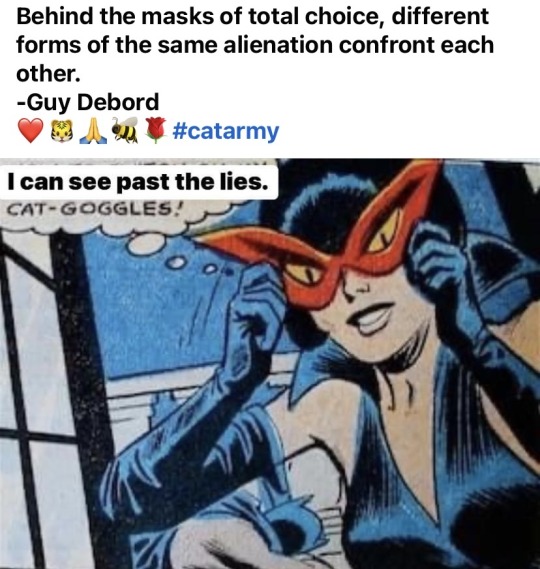#situationist
Photo

Situationist x Yaspis FW23 shot backstage at Paris Fashionweek
#situationist#yaspis#paris fashion week#backstage#Fashion Model#furry coat#beige outfit#beige style#neutralstyle#coatobsession#coats#tenuedujour#stylediaries#styledaily#styledujour#daily wear#dailystyle#aesthetic style#hypebaestyle#dailytrends#sketchonista
1K notes
·
View notes
Text
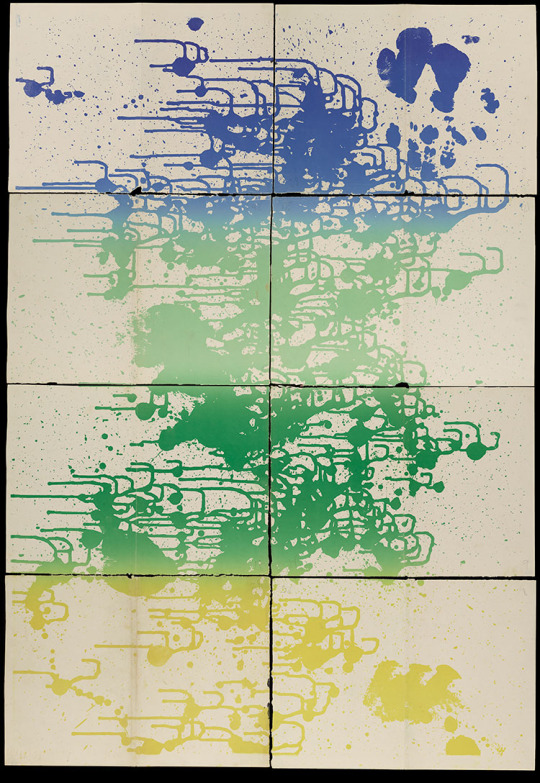
Asger Jorn
Color lithographs for Fin de Copenhague (one side of eight sheets)
1957
#asger jorn#COBRA#situationist#danish art#danish artist#danish painting#danish painter#abstract art#abstract#avant garde#art on tumblr#aesthetic#beauty#modern art#art history#aesthetictumblr#tumblraesthetic#tumblrpic#tumblrpictures#tumblr art#tumblrstyle
76 notes
·
View notes
Text




Beyoncé in custom Situationist x Yaspis — Renaissance World Tour 2023
105 notes
·
View notes
Link
By ‘an activist mentality’ what I mean is that people think of themselves primarily as activists and as belonging to some wider community of activists. The activist identifies with what they do and thinks of it as their role in life, like a job or career. In the same way some people will identify with their job as a doctor or a teacher, and instead of it being something they just happen to be doing, it becomes an essential part of their self-image. The activist is a specialist or an expert in social change.
To think of yourself as being an activist means to think of yourself as being somehow privileged or more advanced than others in your appreciation of the need for social change, in the knowledge of how to achieve it and as leading or being in the forefront of the practical struggle to create this change.
Activism, like all expert roles, has its basis in the division of labour — it is a specialised separate task. The division of labour is the foundation of class society, the fundamental division being that between mental and manual labour. The division of labour operates, for example, in medicine or education — instead of healing and bringing up kids being common knowledge and tasks that everyone has a hand in, this knowledge becomes the specialised property of doctors and teachers — experts that we must rely on to do these things for us. Experts jealously guard and mystify the skills they have. This keeps people separated and disempowered and reinforces hierarchical class society.
A division of labour implies that one person takes on a role on behalf of many others who relinquish this responsibility. A separation of tasks means that other people will grow your food and make your clothes and supply your electricity while you get on with achieving social change. The activist, being an expert in social change, assumes that other people aren’t doing anything to change their lives and so feels a duty or a responsibility to do it on their behalf. Activists think they are compensating for the lack of activity by others. Defining ourselves as activists means defining our actions as the ones which will bring about social change, thus disregarding the activity of thousands upon thousands of other non-activists. Activism is based on this misconception that it is only activists who do social change — whereas of course class struggle is happening all the time.
169 notes
·
View notes
Text

Constant. Architectural design.
#constant nieuwenhuys#architecture#design#utilitarianarchitecture#situationist#situationist international
69 notes
·
View notes
Text

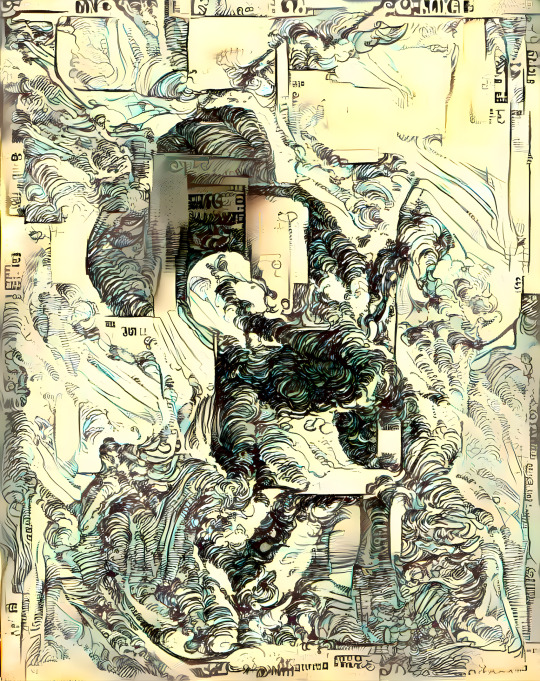
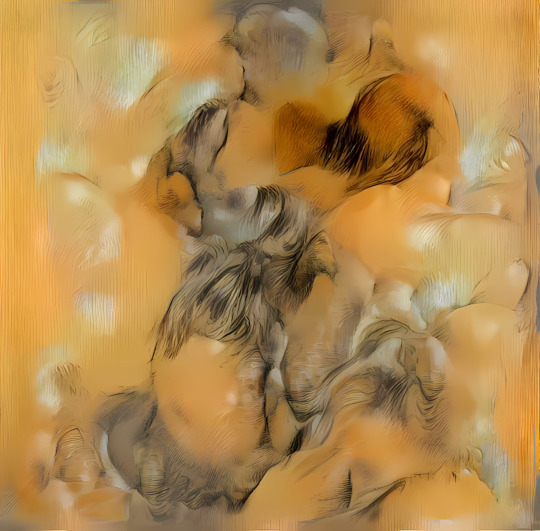
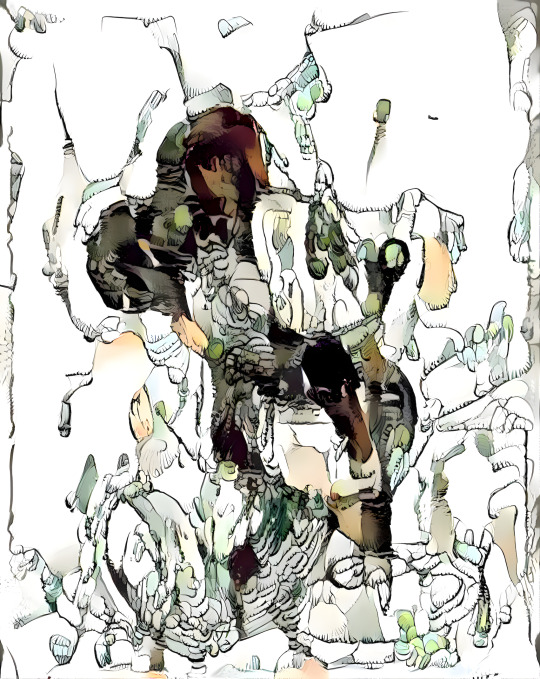
Mickey Détournements Variations I
#glitch#deep dream generator#walt disney#mickey mouse#ai processed#ai art#pop art#détournement#druuna#serpieri#paolo eleuteri serpieri#frank miller#barry windsor smith#comics#situationist
9 notes
·
View notes
Text
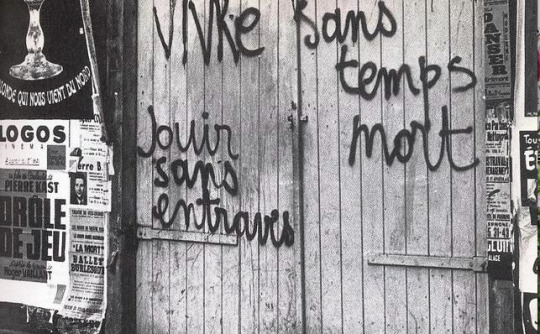
« Vivre sans temps mort et jouir sans entraves »
[“Live without dead time, and enjoy without restraints”]
8 notes
·
View notes
Text

IS posting begins
3 notes
·
View notes
Photo

Isidore Isou, Composition lettriste, 1961.
#Isidore Isou#isou#lettrism#lettrisme#composition#situationnisme#Internationale situationniste#writing#Situationist International#situationist
98 notes
·
View notes
Photo

The first half of the book consists of two new texts. "The Joy of Revolution" is a series of observations on the problems and possibilities of a global antihierarchical revolution. Beginning with a brief overview of the failure of Bolshevism and the inadequacy of reformism, it examines the pros and cons of a wide range of radical tactics, then concludes with some speculations on what a liberated society might be like. "Confessions of a Mild-Mannered Enemy of the State" is largely concerned with Knabb's situationist activities, but it also includes reminiscences of the sixties counterculture and accounts of his Zen practice and other later ventures.
The second half of the book contains virtually all of Knabb's previous publications. Beginning with his 1970 disruption of a Gary Snyder poetry reading, it includes critiques of the New Left and the counterculture; accounts of situationist groups, tactics and scandals;translations of several French texts; an appreciation of the great writer and social critic, Kenneth Rexroth; pamphlets, posters, comics and articles on Wilhelm Reich, radical Buddhists, Japanese anarchists, Chinese dissidents, the 1970 Polish revolt, the 1979 Iranian uprising; and the widely reproduced Gulf war tract, "The War and the Spectacle." The aim throughout is to bring the real choices into the open and to incite people to make their own radical experiments.
https://archive.org/details/publicsecretscollectedskirmishesofkenknabb19701997
9 notes
·
View notes
Text

Situationist shot backstage at Paris Fashionweek
#situationist#YASPIS#paris fashion week#backstage#runway model#fluffy coat#coats#fall trends#swag style#swagger#big earrings#sketchonista#fashion photography#styledujour#street style#hypebaestyle#street fashion#highsnobiety#styleinspo#styleinspiration#style ideas#daily wear#dailystyle#fashion editorial#editorial photography#swag coat
60 notes
·
View notes
Text
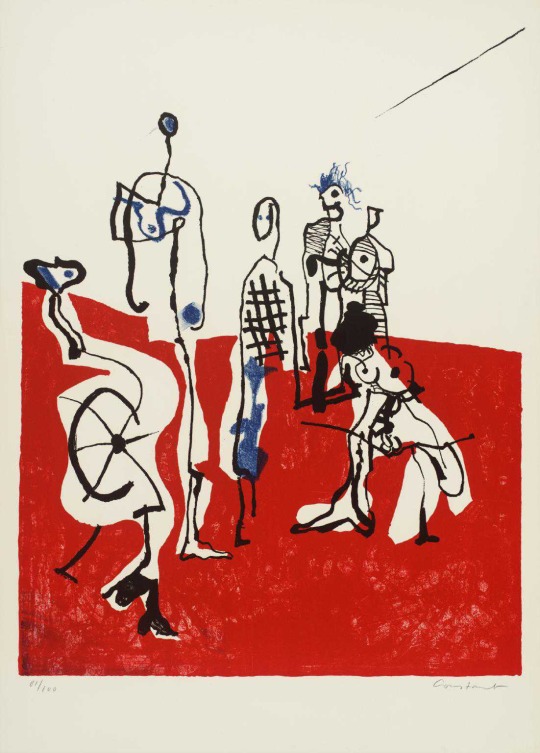
Constant (Constant A. Nieuwenhuys)
Untitled
1975-6
#dutch artist#Constant#Constant Nieuwenhuys#dutch painter#Dutch art#dutch painting#aesthetic#situationist#situationist international#art on tumblr#beauty#modern art#art history#aesthetictumblr#tumblraesthetic#tumblrpic#tumblrpictures#tumblr art#tumblrstyle#artists on tumblr
62 notes
·
View notes
Text
“The spectacle is not a collection of images, but a social relation among people, mediated by images.”
Guy Debord
2 notes
·
View notes
